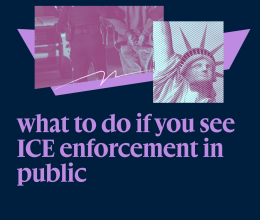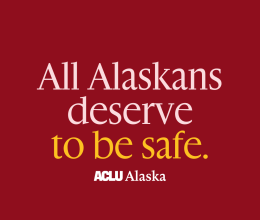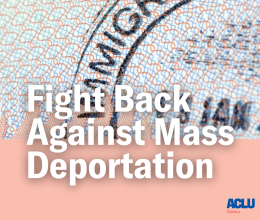
Every Alaskan has a different story. Unless you are indigenous to the land of what is now Alaska, you have an immigrant story somewhere in your lineage. In this way, we are no different than our neighbors, co-workers, friends, and family members who are non-citizen Alaskans. We all hailed from somewhere else once.
Throughout our country and state’s history, immigrants have been integral to our communities, economy, and our nation’s origin story—yet President Donald Trump’s administration has carried out immigration policies far crueler and more extreme than any in living memory. Right now, mass raids, deportation efforts, detention camps, and other harsh measures and scare tactics are tearing at the very fabric of our nation communities. People are afraid to leave their homes, worried a simple trip to the store could end in deportation. Teachers are fearful of the mental toll on their students, knowing some may not feel safe in class. Parents struggle to explain the fear of possible separation to their children.
This blog outlines the ways in which the Trump Administration’s actions have played out in Alaska, and what Alaskans – no matter their citizenship or immigration status – can do to protect themselves, their families, and our communities.
Mass Deportation Looks Different in Alaska
In this current federal administration, mass deportation looks different in Alaska than in the Lower 48. Outside, ICE is conducting mass raids, courthouse arrests, and producing agreements with state and local law enforcement to carry out the federal governments deportation agenda. Such large scale and indiscriminate practices have not yet arrived in Alaska. To our knowledge, ICE has focused its enforcement efforts on specific individuals, who come across their radar through pending applications with U.S. Citizenship and Immigration Services (USCIS), background checks or I-9 investigations (audits of employer compliance and verification of employee identity and work authorization) or having interactions with local or state law enforcement.
Stories of Alaskans like Paola Guzman and Atcharee Bentow represent this kind of targeted immigration enforcement and the way it shows up in communities across the state.
Alaskans are in a difficult position
Like many professional fields in Alaska, our state has an extremely limited number of immigration attorneys who can support or represent Alaskans in their immigration proceedings. This presents many challenges and leaves many Alaskan non-citizens unprepared or underprepared, unrepresented and unaware of their rights or the legal relief for which they may be eligible.
Alaska’s geography creates an unusual immigration proceedings challenge. There is not a ICE detention center in Alaska, which means that once an Alaskan is detained by ICE, they are held briefly in the custody of the Alaska Department of Corrections before being flown to the nearest ICE detention center in Tacoma, Washington, typically within 72 hours. This is where, if eligible, they go through a bond hearing where an immigration judge decides whether to set a monetary amount that, if paid, allows a detained individual to be released while awaiting their removal hearing. Alaskans detained in the Lower 48 go through these challenging legal proceedings separated from their families and communities. If released on bond, they must make their way back to Alaska on their own. However, these bond hearings can and should be conducted while an individual is still in Alaska.
What comes next?
Knowing your rights and responsibilities as a community member is the best way we can push back against the Trump Administration’s immigration regime. So far, the ACLU of Alaska has educated over 400 individuals on how to interact with immigration law enforcement, and how to protect immigrants in various public places. We have upcoming Know Your Rights trainings for shelter providers, for Alaskans who witness immigration enforcement actions, and for Spanish speakers. View all our upcoming trainings here. We are committed to continuing the effort and want every Alaskan to feel safe, prepared, and protected.
The ACLU of Alaska has also created a Family Safety Planning Guide to help individuals and families prepare for potential arrest, detention, and deportation by immigration officials. The immigration crisis is shifting daily, and we want to ensure that every family has a plan in place. The guides have been translated into Spanish, Korean, Tagalog, Russian, Ukrainian, Samoan, Arabic, and Hmong.
Additionally, our partners across the country have produced many resources to support immigrants and their families during these uncertain and unprecedented times. We’ve compiled a series of resources here to help our community feel prepared for the changing landscape of immigration in Alaska and beyond. Check out our resources here.



